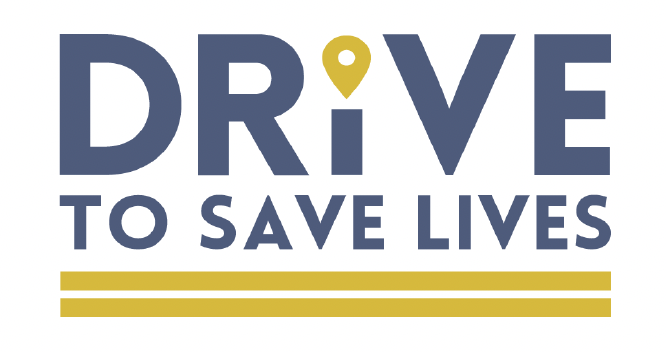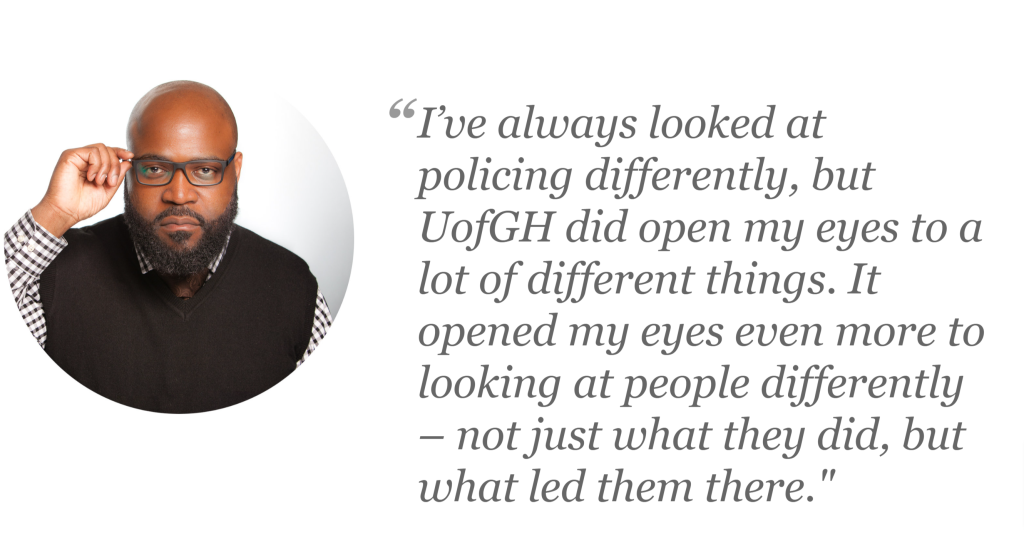Although almost a decade has passed, University of Guelph-Humber Justice Studies alumnus Jeff A.D. Martin still remembers his first public speaking engagement vividly. A police officer with York Regional Police, Martin was preparing to address a room full of Toronto high-school students. He prepared thoroughly, knew exactly what he wanted to say, and took the stage feeling confident – without notes! – and convinced that he was going to exit to a standing ovation.
“When the words actually came out,” Martin recalled with a laugh, “I fumbled, I messed up, it didn’t flow the way I thought it would, and I was kicking myself afterward. I just thought: ‘That was horrible.’”
But he remembers something else about that day. After he finished speaking, he was approached by two students. They thanked him and said that they had learned something from listening to him, something that they could use in the future.
It wasn’t the standing ovation Martin had anticipated, but it had an even more profound impact on him than any amount of applause.
“That’s why I say motivational speaking found me,” Martin said. “My intent was never to go up there and be the next Tony Robbins. My intent was just to share my story in the hopes it could help people.
“Since then, I’ve fallen in love with motivational speaking.”
When you look at Martin’s resume – he’s spent 16 years and counting with York Regional Police, he juggles a nearly full-time career in public speaking, he’s authored two books, he started his own clothing line, and he is the creator of his own non-profit organization, Brothas from the 6 – it’s easy to see why so many people are drawing inspiration from his story.
Tracing an interest in policing
Martin grew up in what he describes as a tough neighbourhood in Toronto. Though he was grateful for the support of a loving family, he also grew up in a community plagued by crime and poverty, one where it could be easy for a young person to feel hopeless about their outlook in life.
“There were times I was surrounded by violence, gangs, guns and drugs. I know I could have easily gone down those paths,” Martin said.
“I posted something today saying, ‘Be careful when you judge someone, because we are all one or two decisions away from being in that bad place.’ I was one or two decisions away.”
Looking around as he grew up, one thing Martin noticed that his community sorely lacked was mentorship and leadership. It was with that in mind that after finishing high school, Martin decided to pursue a college diploma in law enforcement.
But his interest in policing hadn’t been inspired by a lifetime of positive interactions with law enforcement. In fact, it was the opposite.
“Because I grew up in a tough neighbourhood, there were always police around. It always felt like they were harassing us, like we were being picked on,” he recalled. “I would hear people say they hated the police. And I would imagine what if someone had that power, but they wanted to use it for good? To help people, help them figure out who they want to be and grow into what they should become?”
Martin was already working as an officer with York Regional Police when he decided to attend the University of Guelph-Humber’s Justice and Public Safety program to get his degree. He managed to balance full-time shift work with his studies, finding that his work in the classroom and on the force were complementary.
“I said to myself that I deserve the opportunity to go to University, and that’s what brought me to the University of Guelph-Humber,” he said. “Even before joining UofGH, I think with the way I grew up and where I grew up, it gave me a broad perspective in policing. I recognized that there’s no two-year-old who was born wanting to be a drug dealer. It’s through the circumstances around us growing up that lead us down different paths.
“I’ve always looked at policing differently, but UofGH did open my eyes to a lot of different things. It opened my eyes even more to looking at people differently – not just what they did, but what led them there.”
Connecting with youth
Certainly, that ability to connect and empathize with people has been crucial in Martin’s career.
Working as a police officer and in various detective roles, Martin has investigated criminal offences ranging from homicides to property crimes to sexual assaults. With years of experience in a special victims unit, Martin is a youth communication specialist who has conducted more than 1,000 forensic interviews with young people, many of whom were victims or suspects in physical or sexual assault cases.
Author of the charitable children’s book Brothers from the 6/Sisters from the 6: Role Models in my Community and co-author of the personal development book KNew Me, Martin saw his Brothas from the 6 organization grow from modest beginnings. At the beginning, it was merely a Facebook post Martin put up highlighting local people giving back to the community.
“It’s an organization initially started by me just wanting to put out positive messaging about Black men,” explained Martin, who has spoken to audiences across Canada (in person and, recently, virtually). “Sometimes when we watch the news, you see Black men as athletes and rappers. When you see crime on the news, it shows Black men. That’s not who I am, that’s not who my friends are, that’s not who the majority of us are. I wanted to show us in a different light.”
In other words, there’s a tie between Martin’s police work, charitable efforts, and motivational speaking performances: in all cases, he’s trying to stand as a role model and offer mentorship that was in short supply where he grew up.
“I would say it all started again going back to my upbringing,” said Martin, a father of three. “Seeing the young people around me and knowing they had so much potential, but I could see that some of them weren’t doing a whole lot with their life. I think it is because of the lack of mentorship growing up.
“I knew I wanted to be that for the next generation. That was part of me becoming a police officer. Within the Black community, police officers aren’t always looked at as a respectable position. But I knew as a police officer that if I could talk to these kids, if I could speak and they could get to know me, they would recognize that I want to inspire them and I want to see if we can do some work together.”

